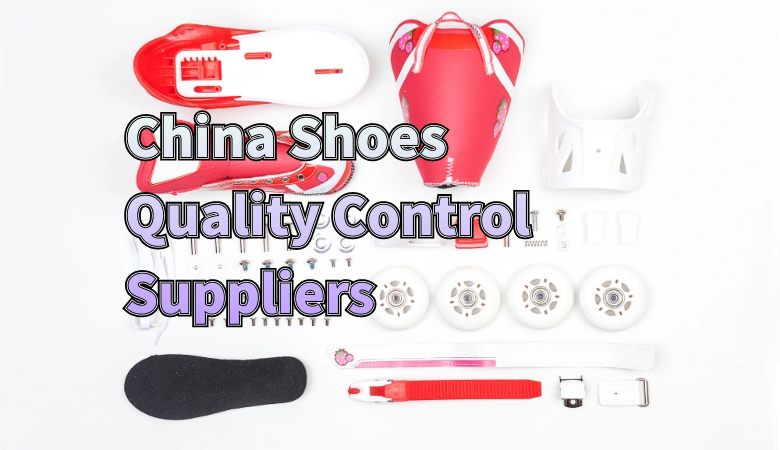With the continuous growth of global demand for Chinese-made footwear products, effective quality control can not only reduce defects but also establish trust and foster long-term cooperation between buyers and sellers in the footwear supply chain.

Common quality issues in footwear manufacturing
In the process of footwear manufacturing, quality control is crucial for ensuring product quality and customer satisfaction.
However, in actual production, some common quality issues are often encountered. These issues not only affect the appearance and performance of shoes, but may also have a negative impact on consumers' experience and brand reputation.
Here are a few particularly prominent quality issues:
Problem description: In footwear manufacturing, the quality of raw materials directly determines the durability and comfort of shoes. If the quality of the raw materials used is inconsistent, such as uneven thickness of leather or insufficient strength of synthetic materials, it can lead to premature wear, cracking, or deformation of shoes during wear.
Impact analysis: Inconsistent materials and poor durability can significantly affect consumers' experience and trust in shoes, thereby damaging the brand's reputation and weakening its market competitiveness.
Problem description: The structural integrity of shoes primarily relies on the quality of stitching and adhesive. Poor craftsmanship, such as loose stitching or weak adhesive, can lead to structural instability in shoes, making them prone to issues like glue failure and thread slippage.
Impact analysis: Defects in stitching or adhesive can directly affect the service life and safety of shoes, reducing consumers' willingness to purchase and loyalty.
Problem description: In the process of shoe manufacturing, the alignment of components and the accuracy of sizing are crucial. Minor alignment issues, such as misalignment between the upper and the sole, or incorrect sizing, can lead to uncomfortable shoes and affect the wearing experience of consumers.
Impact analysis: Misplaced components or incorrect sizes can seriously affect consumer satisfaction and purchasing decisions, reducing a brand's market share and customer loyalty.
Failing to meet safety standards
Problem description: As a necessity for daily wear, the safety of footwear is of utmost importance. If shoes fail to comply with relevant safety regulations, such as insufficient slip resistance or containing harmful chemicals, they may pose potential threats to consumers' health and safety.
Impact analysis: Once shoes that fail to meet safety standards enter the market, they may lead to serious consequences such as product recalls and legal penalties, causing immeasurable damage to the brand's reputation and long-term development.
To ensure product quality and consumer satisfaction, manufacturers should strictly control the quality of raw materials, optimize production processes, strengthen quality inspection, and strictly comply with relevant safety regulations. Only by doing so can they produce high-quality shoes that are both aesthetically pleasing and practical, comfortable and safe, thereby earning the trust and affection of consumers.
To assist you in making an informed choice, below are some key steps and considerations, particularly regarding evaluating the supplier's quality control system, conducting factory audits, verifying compliance with global standards, and ensuring communication and transparency.
When selecting footwear suppliers, priority should be given to those who possess internationally recognized quality control system certifications. For instance, ISO 9001 quality management system certification serves as a significant indicator of the rigor of a supplier's quality management processes. Additionally, REACH certification ensures that products comply with the European Union's regulations on the registration, evaluation, authorization, and restriction of chemicals, while ASTM standards encompass a wide range of technical specifications for materials, products, systems, and services. Seeking suppliers with these certifications can significantly reduce product quality risks.
Visiting suppliers' production facilities in person is the most direct way to assess their production practices and quality systems. Through factory audits, you can gain insight into suppliers' production processes, equipment conditions, employee training, and quality control measures. This helps you determine whether the supplier has the capability to produce high-quality products and the level of importance they place on quality management.
When selecting suppliers, it is imperative to require them to provide product testing reports and compliance documents. These documents should demonstrate that the products comply with international safety, environmental protection, and performance standards. By carefully reviewing these documents, you can ensure that the footwear products you procure meet the regulatory requirements of the target market, thus avoiding potential legal risks and reputational damage.
Establishing open communication channels with suppliers is crucial for ensuring product quality and promptly addressing issues. You should clarify quality expectations with suppliers, including product specifications, inspection standards, and delivery timelines. Additionally, ensure that suppliers are willing and able to promptly respond to your inquiries and feedback, and collaborate to resolve issues. Transparent communication fosters trust and facilitates the establishment of long-term partnerships.
In the footwear manufacturing industry, quality control is a crucial aspect to ensure that products meet high standards and satisfy consumer expectations. Outsourcing footwear quality control to professional third-party inspection agencies is gradually becoming a wise choice for many enterprises.
Here are the multiple advantages brought by this decision:
Third-party inspection agencies possess profound professional knowledge and extensive practical experience in the field of footwear quality control. They are familiar with industry-specific quality standards, testing methods, and production processes, enabling them to comprehensively and accurately evaluate various performance indicators of footwear. This accumulation of professional knowledge ensures the professionalism and effectiveness of quality control work.
With the continuous updating of industry standards and advancements in technology, third-party inspection agencies can swiftly adapt to these changes, ensuring that quality control efforts remain up-to-date. This provides enterprises with continuous and stable support for quality control.
The inspectors from third-party inspection agencies are independent and not bound by internal corporate interests. They can objectively and impartially evaluate the quality of footwear products, ensuring the accuracy and credibility of the evaluation results.
An impartial evaluation result not only provides a reliable basis for quality control for enterprises, but also enhances consumers' trust in the product. This trust serves as an important cornerstone for brand reputation and market share.
Third-party inspection agencies conduct comprehensive quality inspections on footwear products, covering multiple aspects such as materials, craftsmanship, and performance. This thorough examination enables timely detection and correction of potential quality issues, thereby minimizing disruptions and delays in the production process.
Should there be any quality issues with footwear products, it may lead to recall incidents, causing significant economic losses to the enterprise. However, the professional quality control conducted by third-party inspection agencies can effectively mitigate such risks, safeguarding the enterprise from incurring exorbitant recall costs.
For growth-oriented enterprises, as their business scale expands, the complexity and workload of quality control also increase accordingly. Third-party inspection agencies are scalable and can provide corresponding quality control support according to the needs of enterprises, ensuring that enterprises maintain a consistent quality level while expanding their business.
Outsourcing quality control to third-party inspection agencies allows enterprises to focus more on the development of their core business and optimize resource allocation. At the same time, the professional services and economies of scale provided by third-party inspection agencies can also bring cost savings to enterprises.
To maintain long-term supplier relationships, conducting regular quality control inspections and audits is a crucial aspect. Through a continuous and systematic inspection process, we can ensure that the products or services provided by suppliers consistently maintain high standards. These inspections not only help monitor the current quality level but also enable timely detection of potential issues and risks, allowing for preventive measures to be taken to avoid further deterioration. Regular quality control inspections and audits can enhance trust between both parties, and a transparent and reliable quality control mechanism serves as the cornerstone for establishing a solid partnership.
At the outset of establishing long-term supplier relationships, a contract agreement that clearly outlines quality standards is indispensable. This agreement should meticulously define the expectations of both parties regarding quality and performance, as well as delineate their respective responsibilities and obligations. By clarifying these terms, we can effectively avoid misunderstandings and disputes arising from unclear quality standards. The quality standards outlined in the contract agreement not only provide clear guidelines for suppliers but also establish definitive acceptance criteria for us as customers. In this way, both parties can have a solid foundation to rely on during the cooperation process, jointly striving to achieve high-quality products and services.
In maintaining long-term supplier relationships, actively providing feedback and promoting collaborative improvement is equally crucial. We should regularly share constructive feedback with suppliers, highlighting their strengths in products or services as well as areas for improvement. This open and honest communication approach can encourage suppliers to continuously improve and innovate, thereby enhancing their competitiveness. At the same time, we should also be willing to listen to suppliers' opinions and suggestions, and jointly explore ways to improve our cooperation methods. Through joint efforts and continuous improvement by both parties, we can establish a closer and more efficient partnership, jointly face market challenges, and achieve win-win development.
Quality control is the key to ensuring the reliability of footwear manufacturing in China. By taking proactive measures, buyers can establish trust with suppliers and maintain long-term cooperation. Effective quality control can protect corporate reputation, meet customer expectations, and achieve success in the competitive global market.

The Smart Sourcing & Quality Assurance Content Team is dedicated to delivering high-quality, easy-to-understand information that empowers our audience to navigate the complexities of global sourcing and quality assurance. Our team of writers has extensive experience in creating content across various fields, including procurement, supply chain management, quality assurance, market trends, and industry best practices. We specialize in sectors such as apparel, textiles, and consumer goods, providing targeted insights to help businesses in these industries optimize their sourcing strategies, ensure product quality, and maintain a competitive edge in the market.